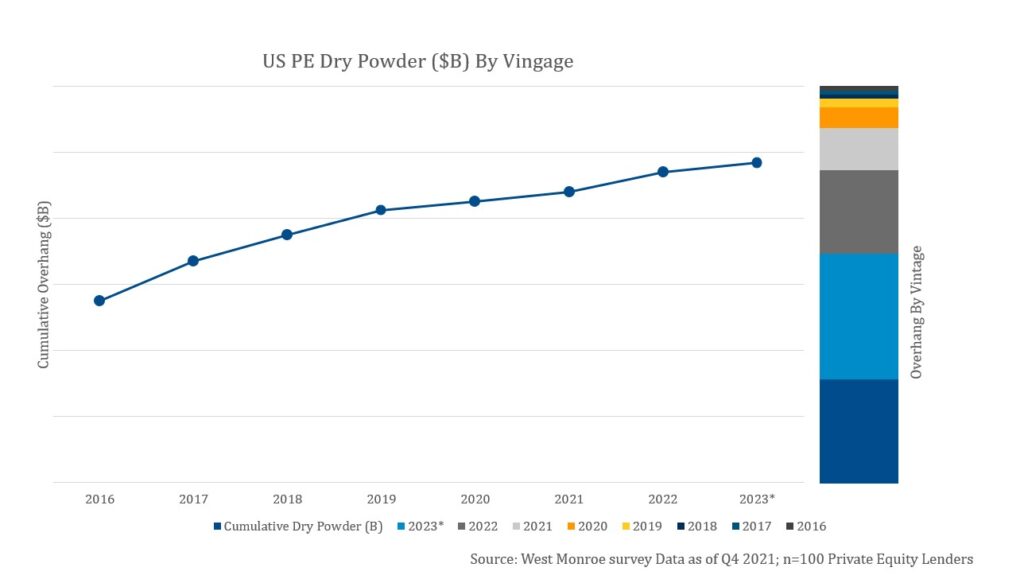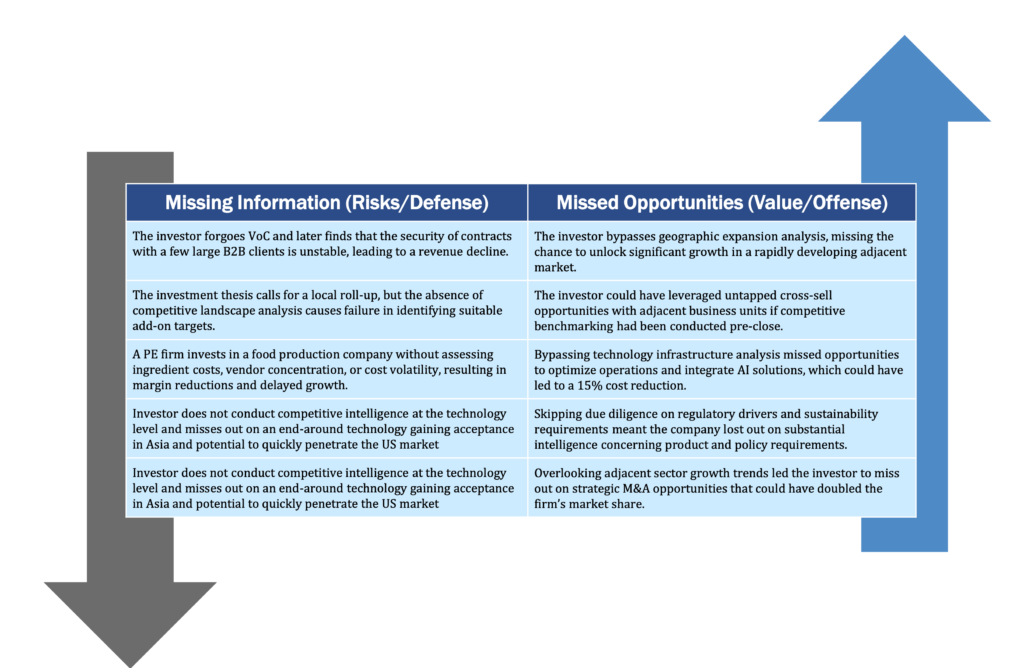The Importance of Expert-Led Commercial Due Diligence in Private Equity Investments
By Rick Claar and Josh Emington
In the fast-paced world of private equity (PE), making well-informed investment decisions is critical to delivering returns to limited partners (LPs) and maintaining a competitive edge. As economic uncertainty, shifting market dynamics, and increased competition have become the norm, private equity firms face unprecedented pressure to conduct thorough and precise evaluations of potential investments. Investors understanding the role and appropriate application of research and strategic consulting in the deal process are well positioned to maximize ROI and minimize otherwise undiscovered risks.
Commercial due diligence (CDD) plays an essential role in this process, providing a deep dive into a target’s market, competitive landscape, and growth potential. Now more than ever, engaging in CDD can significantly improve the investment decision-making process and drive higher returns…quickly, efficiently and reliably.
Why Commercial Due Diligence is Gaining Steam
The economic landscape in 2024 is vastly different from that of just a few years ago. Market volatility, higher interest rates, and a backlog of capital — the proverbial “dry powder” — have created something of a perfect storm for heightened competition and risk. Investors are increasingly cautious, as exit opportunities have slowed and valuations have become more unpredictable. In such an environment, commercial due diligence serves as an essential tool for private equity firms to de-risk deals and identify the most promising opportunities.

As we move into Q4 of 2024 the private equity deal market seems to be recovering as transaction activity is ticking up, employment returns to a healthy environment (the economy is ‘good enough’), and LPs influence PE firms with extended hold times to sell. In the interest of their investors (accredited, institutional, retail, and otherwise), LPs have a responsibility to seek attractive and timely returns. LPs apply this pressure in a variety of ways from direct calls to accelerate the return of capital, to writing smaller checks, to requests for greater transparency from GPs. In this environment with extended hold times GPs are challenged to produce a track record that will attract and maintain LPs amid increased competitive tension with other GPs.
Several key factors have made CDD more critical now than ever:
1. Volatility and Economic Uncertainty
Post-pandemic recovery has been uneven, and many industries are experiencing unpredictable shifts in demand and performance. Some sectors that thrived during the pandemic are now stabilizing, while others are still struggling to recover. For private equity firms, it’s vital to understand whether a company’s performance is a reflection of temporary conditions or long-term, systemic changes with staying power. Without this understanding, firms run the risk of making investments based on outdated assumptions, which can result in poor performance post-acquisition.
2. Mismatched Valuations
There is currently a significant mismatch between the asking prices of sellers and the willingness of buyers to meet those prices. Sellers, having benefited from the boom following the COVID-19 era, are often reluctant to adjust their expectations downward, even as market conditions soften. Commercial due diligence allows buyers to better assess whether a company’s asking price is justified, helping to avoid overpaying for an asset that may not deliver the expected returns.
3. Increased Competition for Attractive Assets
With billions in undeployed capital across the private equity industry, competition for high-quality assets is fierce. In many cases, firms are bidding against each other for a limited number of strong targets, driving up prices. Thorough and strategic commercial due diligence provides private equity firms with the insights needed to make informed bids, helping to ensure that they are not overpaying or entering into a bidding war for an asset that doesn’t warrant such competition. Dry power (capital waiting to be invested) is at an all time high, and it continues to pile up!
4. Weaker Quality of Available Companies
Many high-quality businesses are holding off on sales due to current lower valuation multiples, meaning that some of the companies currently on the market may not be the best performers. This creates an additional layer of risk, as investors must be more diligent than ever in uncovering hidden weaknesses in target companies. We are seeing cases in which sellers may try to proverbially “put lipstick on the pig” to make their businesses look more attractive than they truly are. Comprehensive CDD can help lift the veil to uncover such risks before a deal is finalized.
The Value of Engaging Experts in Commercial Due Diligence
Private equity firms that engage in a granular study to perform commercial due diligence gain access to a wealth of specialized knowledge that goes far beyond financial analysis. Commercial due diligence delves deep into the business model, market environment, competitive positioning, customer relationships and growth opportunities.
Here’s how expert-led CDD can add significant value to any investment opportunity assessment:
1. De-Risking the Deal
One of the primary objectives of CDD is to thoroughly assess and mitigate risks associated with an acquisition. This includes understanding macroeconomic trends, market dynamics and internal vulnerabilities.
For example, if a target company relies heavily on a few large customers, and the relationship with those customers is uncertain, the deal poses significant risk. Similarly, if the market is contracting or highly competitive, investors need to be aware of these dynamics before moving forward. Expert-led CDD helps investors make informed decisions by identifying potential risks that could jeopardize the investment’s success.
2. Go-to-Market Intelligence
In addition to identifying risk, CDD uncovers valuable insights into how the target company can succeed in an existing or new marketplace. This includes understanding customer needs, assessing competitors’ strengths and weaknesses, and evaluating market trends. With this intelligence, private equity firms can develop more effective post-acquisition strategies, ensuring that the company is well positioned for growth.
Many investors overlook the importance of go-to-market diligence, only to find themselves scrambling to gather this information post-acquisition. By engaging experts during the diligence phase, firms can avoid the costly mistake of having to revisit these issues later, say in the 90-day-plan phase.
3. Maximizing Value Creation
Commercial due diligence isn’t just about identifying risks — it’s also about finding opportunities. Thorough CDD can reveal strategic options for increasing a company’s value, such as identifying new markets, purchase drivers, technologies, etc.
Here are some of the most common ways that private equity investors leverage commercial due diligence learnings to create measurable value that allows them to achieve a more profitable exit:
- Product/Service & Channel Prioritization – focusing on high margin and high-growth opportunities to increase revenue
- Geographic Expansion – identify and pursue new geographies that are ripe for entry by the target
- Customer Segmentation – detail the ideal customer profile (ICP), along with clear purchase and switching criteria for the target to improve targeting and client acquisition … similarly understand/benchmark successful in-market customer loyalty and retention techniques
- Illuminate Cross-selling and Upselling Opportunities – develop systems to leverage client relationships and improve customer lifetime value (LTV)
- Pricing Strategy – understand the target’s pricing power within the market, potential for price increases, and elasticity to maximize revenues without losing customers.
- Competitive Benchmarking – unlocks technologies, vendors, or partners


For those brave souls who want to create yet another level value with careful planning, there are opportunities to increase the exit multiple through multiple-expansion for the target, above and beyond improvements to key financial metrics such as revenue and EBITDA.
4. Cost Savings and Efficiency
While some private equity firms may hesitate to invest in expert-led CDD due to perceived costs, the reality is that such work can save (or make) significant money in the long run. In particular, many middle-market firms assume they can’t afford this level of strategic consulting, believing it will cost hundreds of thousands of dollars. However, it is possible to engage quality CDD services at a much lower cost than in the past, making it accessible even to smaller investors.
Additionally, conducting thorough due diligence upfront can prevent costly mistakes and reduce the need for expensive course corrections post-acquisition. It’s very likely that such work will be conducted at some point — too often, post-acquisition. Doing the CDD prior to the deal reduces costs and workload by engaging in the study when leadership isn’t so time-pressed to immediately create value and demonstrate performance in that first 90 days after closing.
5. Supporting Post-Acquisition Strategy
Strategic CDD also plays a key role in shaping a company’s post-acquisition strategy. By providing insights into market opportunities, competitive positioning, and customer behavior, CDD equips private equity firms with the knowledge they need to hit the ground running. In fact, CDD can effectively set the priorities for the first 100 days after the acquisition, ensuring that the company is well prepared to execute its growth plan, both in the short term and over the broader long-term strategic time horizon.


6. Enhancing Negotiation Leverage
Comprehensive due diligence can also improve a firm’s position during deal negotiations. If due diligence reveals issues with a target company’s performance, market position, or customer base, investors can use that information to renegotiate terms, potentially securing a better deal than they would have without such intelligence. This ability to negotiate from a position of knowledge can result in significant savings for the investor. Or it might even inform a calculated decision to walk away from a deal that no longer appears favorable.
Why CDD’s Time Has Come Like Never Before
Despite the clear benefits, commercial due diligence is often underutilized, particularly in middle-market and growth-stage investments. Many firms mistakenly believe that CDD is only necessary for large, platform investments, or they assume they can forego diligence on bolt-on acquisitions.
This is a risky approach. As markets become more complex and competition intensifies, even smaller investments can benefit from the thorough insights that expert-led CDD provides. Cutting edge investors will engage with pre-deal due diligence in a new way and reap the rewards of this new attitude … moving from ‘getting diligence done’ to ‘building a true competitive advantage with diligence’.
Moreover, in today’s market, where many companies are still grappling with the aftereffects of the pandemic, supply chain disruptions, and inflationary pressures, understanding the full picture is more important than ever. Private equity firms that engage experts for CDD gain a competitive edge by de-risking their investments, uncovering growth opportunities, and entering deals with greater confidence.
As competition intensifies and risks increase, the insights gained from comprehensive CDD can mean the difference between a successful investment and a costly mistake. By engaging outside experts, PE firms can ensure they have a complete understanding of a target’s market, competitive position, and growth potential, positioning themselves for success in every deal.
Here are few examples of what can result in the absence of thorough commercial due diligence:


More to Come:
This is the first in an ongoing series of pieces exploring the benefits and methodologies associated with commercial due diligence for the private equity sector, culminating in a forthcoming white paper.
Future installments will include:
- What are the components of a CDD engagement, and how do you get started?
- How can CDD projects be customized and tailored to fit specific needs and unique markets or situations?
- CDD to Gain Customer Intelligence
- CDD to Gain Market Intelligence
- CDD to Gain Competitive Intelligence
- Success Stories of Deals De-Risked, Including Key Outcomes Achieved


Every year we conduct numerous strategic due diligence projects that we carefully tailor to the exact specifications and information needs of our private equity clients. If you would like to discuss the CDD methodologies that may be appropriate for your next deal assessment, contact us, and will review your situation and provide you the best guidance we can offer!
Linked here and ready for download is the one-pager our team typically hands to investors at key industry conferences like DealMAX, regional ACG Capital Connection events, and AM&AA: The Martec Group – Private Equity One-pager.
